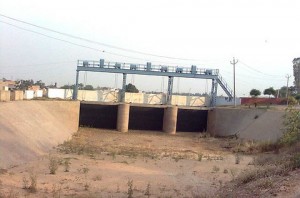Special News
Warning signs for Punjab in SYL case; River Water Disputes – Legislature can’t nullify judgments, says SCI
May 8, 2014 | By Sikh Siyasat Bureau
New Delhi, India (May 08, 2014): It is learnt that the Supreme Court of India on Wednesday (May 07) ruled that Indian Parliament and the State Assemblies had no power to enact laws to nullify judicial verdicts based on facts and findings.
“Under the pretence of power, legislature cannot neutralise the effect of the judgment given after ascertainment of fact by means of evidence/materials placed by the parties to the dispute,” a Constitution Bench headed by Chief Justice RM Lodha held.
“A plain and simple judicial decision on fact cannot be altered by a legislative decision by employing doctrines or principles such as public trust doctrine, precautionary principle, larger safety principle and competence of state legislature to override agreements between two states,” the Supreme Court of India’s bench ruled.

A view of Hansi-Butana Canal. The project is waiting to be linked to Bhakhra Main Line near Samana (Punjab). [File Photo]
The Supreme court verdict in this case could have a direct and adverse bearing on Punjab’s case.
It may be recalled that in 2004 the Supreme Court of India had directed Punjab government to complete construction of controversial Satluj-Yamuna Link (SYL) canal before 14 July, 2004.
Punjab state assembly had enacted Punjab Termination of Agreements Act nullifying the so-called water sharing agreements.
The Presidential Reference on validity of the Punjab Termination of Agreements Act, 2004, is still pending in the SCI.
The Supreme Court reportedly made the ‘clarification’ while virtually quashing a law enacted by the Kerala Assembly in 2006, primarily nullifying its verdict earlier that year allowing Tamil Nadu to store more water in the Mellaperiyar Dam across Periyar river.
“The rights of Tamil Nadu, crystallised in the judgment dated 27 February 2006 passed by this court in WPC No. 386/2001 cannot be nullified by a legislation made by the Kerala State legislature,” the Supreme Court ruled.
The other judges on the Constitution Bench were Justices HL Dattu, CK Prasad, Madan B Lokur and MY Eqbal.
The SCI acknowledged that under the Constitutional principle, the legislature had the power to render judicial decisions “ineffective by enacting validating law within its legislative field fundamentally altering or changing its character retrospectively.”
But this power “has no application where a judicial decision has been rendered by recording a finding of fact… A (judicial) decision which disposes of the matter by giving findings upon the facts is not open to change by legislature. A final judgment, once rendered, operates and remains in force until altered by the court in appropriate proceedings,” the SCI said.
To Get Sikh Siyasat News Alerts via WhatsApp:
(1) Save Our WhatsApp Number 0091-855-606-7689 to your phone contacts; and
(2) Send us Your Name via WhatsApp. Click Here to Send WhatsApp Message Now.
Sikh Siyasat is on Telegram Now. Subscribe to our Telegram Channel
Related Topics: Punjab Water Crisis, Satluj Yamuna Link (SYL) Canal, SCI




